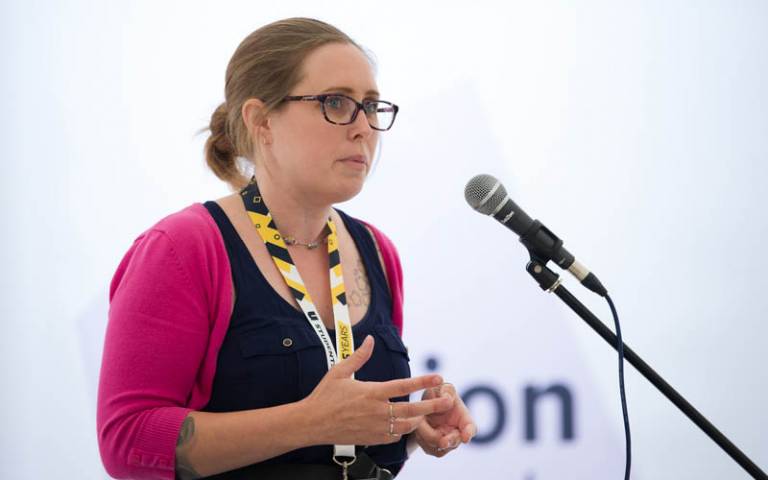Gaining Fellowship increased my confidence: Abbie King
Abbie King explains how gaining Fellowship through the UCL Arena pathway for Professional Services increased her confidence and created parity with her colleagues.

18 March 2019
If you support students in a non-teaching role, the UCL Arena pathway for Professional Services offers you the opportunity to gain recognition for your work supporting their learning with a UCL Arena fellowship, accredited by the Higher Education Academy (HEA).
This is suitable for staff in learning support roles, including:
- Teaching Administrators
- Lab Technicians
- ISD/Digital Education
- Central services, and;
- Librarians
Abbie, Projects Manager in UCL Arena Centre for Research-based Education, explains why she applied for UCL Arena Fellowship and how it has helped her:
Which Arena pathway did you follow and where did you hear about it?
I followed the Arena Open pathway, applying for FHEA. As a member of staff in the Arena centre, I was pretty familiar with the scheme although less so with how professional services staff engaged with it.
What was your motivation?
Partly it was about gaining parity with other staff in the department. All the Teaching Fellows in the Arena Centre have Fellowship but very few of the professional services staff do, which has always really interested me.
I think it is partly because the mapping process to the UK Professional Standards Framework (UK PSF) isn’t always as immediately obvious for support staff, but actually there is a huge amount of help available from the Arena centre, with dedicated support for professional services colleagues.
It was also very much about wanting something to show professionally for the time and dedication I put in to supporting learning as a member of the professional services team.
Supporting learning and creating inclusive learning environments – whether this is for students or staff – drives me to continually develop and enhance the initiatives and projects I am involved in. Application for FHEA was my chance to reflect on those values and articulate what it was I was doing and why.
Finally, I knew they needed more professional services staff achieving FHEA or above in order to help with Arena Assessing so it felt like a way for me to be more involved in this whole process and be part of a really lovely community of assessors from across the university.
What was the most useful element?
Writing the case studies was really useful. It really was a chance to revisit and reflect on what I had done and achieved, and in a way it reconnected me with some of the values around things like working with students as partners and designing sessions to encourage participation and engagement.
Sometimes in the bustle of daily life the ‘why’ can be lost in the processes and just trying to get everything done.
Taking time to reflect and think and consider was such a constructive exercise.
How has it changed your support for teaching?
A lot of people say this, but it has given me more confidence.
Reflecting on why I did things in a certain way and what influenced those decisions makes me trust my processes and ability to make decisions to benefit student learning in the right ways.
I often revisit the case studies I wrote when approaching other work I am involved in as a way of ensuring my values are at the forefront of my mind or to help me really think through the purpose of my role.
How do you think your students have benefited from you taking part?
I think that by reconnecting with the ‘why’ has made me more critical of what I am doing on a day-to-day basis, but also, now that I am involved in some bigger institutional projects to always interrogate why we are doing things and how we go about them.
When did you achieve Fellowship?
I achieved Fellow of the Higher Education (FHEA) at the end of 2017.
How much of a commitment was it for you?
Writing the case studies was challenging; also finding the time and I lacked confidence in writing reflectively like this.
Going along to a few writing days to get me started really helped and also just getting advice from the Arena Centre sessions was invaluable. They really build up your confidence and give you tips and tricks on how to approach writing case studies like these.
 Close
Close

